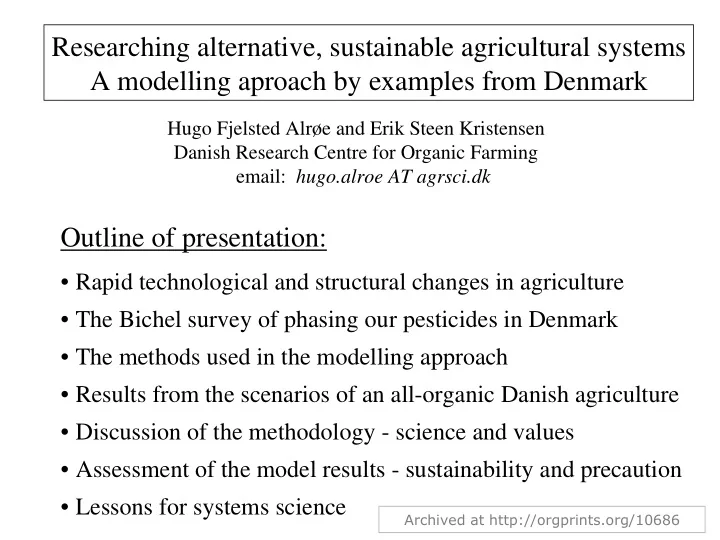

Researching alternative, sustainable agricultural systems A modelling aproach by examples from Denmark Hugo Fjelsted Alrøe and Erik Steen Kristensen Danish Research Centre for Organic Farming email: hugo.alroe AT agrsci.dk Outline of presentation: • Rapid technological and structural changes in agriculture • The Bichel survey of phasing our pesticides in Denmark • The methods used in the modelling approach • Results from the scenarios of an all-organic Danish agriculture • Discussion of the methodology - science and values • Assessment of the model results - sustainability and precaution • Lessons for systems science Archived at http://orgprints.org/10686
The Bichel survey Final report from the main committee The main committee with expert members representing vested interests in society Five specialist reports Four sub-committees with An inter-disciplinary group specialist research members on total organic conversion More than 60 reports from specialist consultants in different disciplines and sciences
Systems science and systems values • Neither experiments nor environmental monitoring can prevent all systemic consequences - due to the time lag between the act and the measurable consequence and - due to ignorance of possible consequences • Decisions based on risk assessments and economical decision theory will not prevent the systemic consequences of rapidly changing new technologies • Acknowleding the human dependency, and growing influence, on the environment leads to a principle of precautionary acting • The development of scientific strategies for handling uncertainty and ignorance involves value inquiry and ethics • Sustainability as functional integrity and the principle of precaution are key examples of elements in a systemic ethics
Lessons for systems science • Inquiry into values and basic perceptions involved is decisive in the modelling of alternative agricultural systems • The presumptions of the model are related to the vision of a future state and the values related to this vision • Value inquiry forms the basis for determining and critically evaluating the necessery presumptions • And conversely, the scenario results make the value inquiry more precise and substantiated • The involvement of experts in the value inquiry is crucial, in order to gain an informed critique of the presumptions • Values are also important in the assessment of the model results • Value inquiry constitutes a key element of situated systems science
Recommend
More recommend